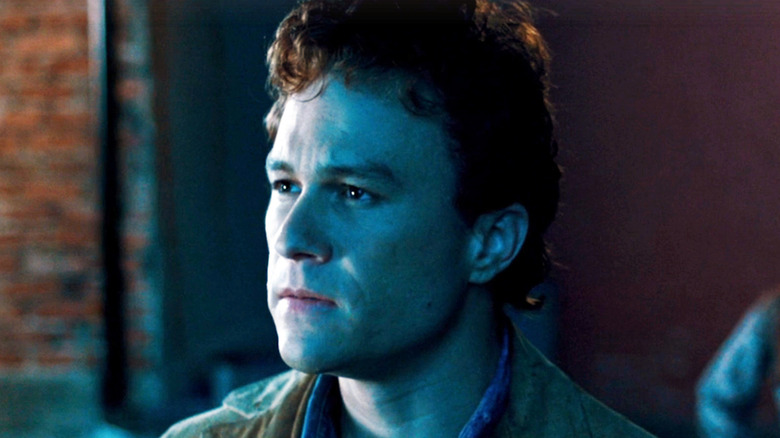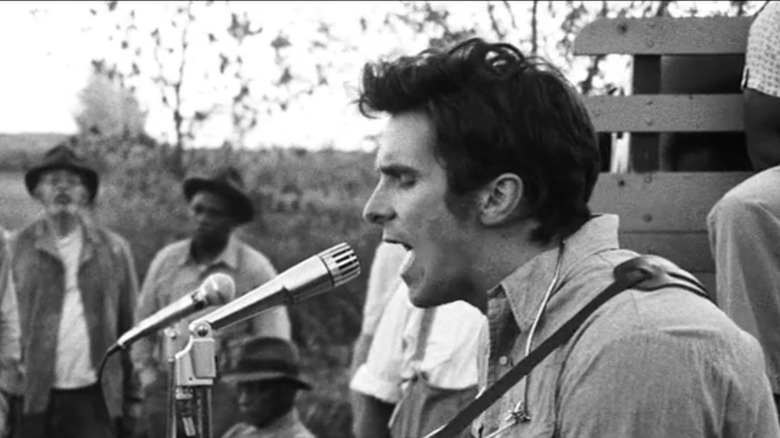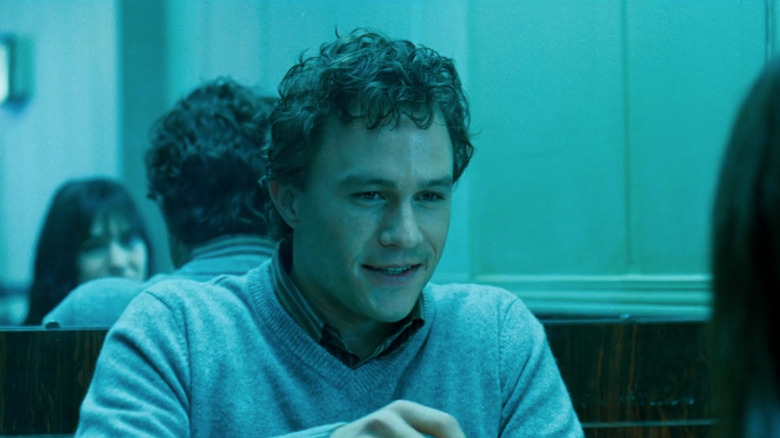Heath Ledger Had Trouble Portraying Christian Bale's Take On Bob Dylan In I'm Not There
Todd Haynes is known for his uniquely experimental approach to filmmaking, but 2007's "I'm Not There" might be his most ambitiously inventive project to date. So ambitious, it seems, that his characteristic directorial flair confused one of the film's stars — namely, Heath Ledger.
Having already taken on the entire Glam Rock era with 1998's "Velvet Goldmine," Haynes turned his attention to an even more daunting task: telling Bob Dylan's life story. The director first had to come up with a concept interesting enough to persuade the notoriously mercurial Dylan to grant permission to depict his life on-screen. Naturally, he came up with a film that, on the surface, didn't seem to be about Bob Dylan at all. Instead, six actors would portray six different characters with names like Arthur Rimbaud, Jack Rollins, and Robbie Clark — all versions of Dylan at various points in his life.
The inventive concept won over the iconic musician, who must have also been delighted when Haynes cast top-tier actors in the various roles. In fact, when it came to Jack Rollins and Robbie Clark, Haynes cast Christian Bale as the former and Ledger as the latter. Not content with the already potentially confusing conceit at the heart of "I'm Not There," the director made it so that Ledger would actually be portraying an actor who plays a younger version of Jack Rollins (Bale's character). That all might sound needlessly convoluted, and it kind of is. Even if it does fit with Dylan's own penchant for reinvention and misdirection, the whole concept seemingly left Ledger himself at somewhat of a loss.
Who's playing who?
In a 2007 New York Times article, both Haynes and Ledger spoke about the making of "I'm Not There," expanding on some of the challenges faced during production. One of the main issues for the actor was the obvious confusion over who exactly he was playing. Already faced with portraying one of the greatest musicians in pop music history, the naturally self-doubting Ledger also had to take into account the version played by Bale, who was set to film his scenes later.
As the late actor put it, he was basically supposed to be "playing an actor portraying Christian portraying a Dylanesque character, and not being sure what Christian was going to do." It's no surprise such a task left the actor "stressed out a little too much."
Ledger also notes in his interview that "I'm Not There" represents a film that audiences have to "accept and invite instead of trying to challenge and solve." All of which suggests he took a similar approach to his role in the project, despite also claiming he wasn't "proud" of his contribution. That's no surprise considering the actor was known for his self-doubt and maintained a harsh self-criticism throughout his career. Either way, Todd Haynes himself seemed pleased with Ledger's James Dean-like "precocious seriousness."
'Not much required from me'
Hayne's second musical biopic remains an impressive feat. Upon its release, critics praised the movie and focused on Cate Blanchett's deft turn as mid-60s Dylan in the form of Jude Quinn. In fact, she earned a Film Independent Spirit Award for Best Supporting Female as well as a Golden Globe for Best Supporting Actress. But Ledger arguably had the harder task in an already ambitious project.
Acting in the shadow of Christian Bale itself would be enough to make any actor nervous. But Ledger not only hadn't seen the choices Bale would make as Jack Rollins, he wasn't even sure if he should be trying to act like Bale's version of Dylan at all. His character, Robbie Clark, was based at least in part on Dylan's time in Greenwich Village and would depict the disintegration of his marriage in an echo of the artist's 1970s "Blood On The Tracks" era.
It seems that in the face of such a monumental and disorienting job, Ledger took a minimalist approach. In a promotional interview for "I'm Not There," the "Dark Knight" star spoke about how he let the script do much of the work for him, saying that "not a lot really went into it. Todd gave me everything I needed on-page. There wasn't too much required from me." Considering his desire at the time to break away from being a rom-com heartthrob, it's not surprising that Ledger took on Haynes' ambitious project — no doubt propelled by that "precocious seriousness."


